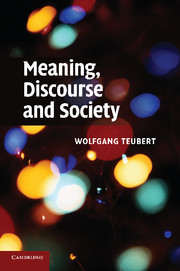Book contents
- Frontmatter
- Contents
- Acknowledgements
- Introduction
- Part I Meaning, the mind and the brain
- Part II Discourse and society
- 8 Language as discourse
- 9 Society presupposes language, and language presupposes society
- 10 A closer look at oral societies
- 11 Differences between oral and literate societies
- 12 Empirical linguistics deals only with recorded language
- 13 Meaning, knowledge and the construction of reality
- 14 The language of the scientific experimental report
- 15 Diachronicity, intertextuality and hermeneutics
- 16 Meaning and the interpretation of a haiku
- Conclusion
- Bibliography
- Index
8 - Language as discourse
Published online by Cambridge University Press: 04 August 2010
- Frontmatter
- Contents
- Acknowledgements
- Introduction
- Part I Meaning, the mind and the brain
- Part II Discourse and society
- 8 Language as discourse
- 9 Society presupposes language, and language presupposes society
- 10 A closer look at oral societies
- 11 Differences between oral and literate societies
- 12 Empirical linguistics deals only with recorded language
- 13 Meaning, knowledge and the construction of reality
- 14 The language of the scientific experimental report
- 15 Diachronicity, intertextuality and hermeneutics
- 16 Meaning and the interpretation of a haiku
- Conclusion
- Bibliography
- Index
Summary
Children learn to speak as they grow up among people who are already speaking. These people are normally their parents or other carers, or other people with whom they are brought into contact, and, of course, their peers. It is the interaction with other people that lets children learn the language(s) they encounter in their environment. It is not more normal for children to learn just one language than several. Multilingualism is the norm in many societies and situations, and this is not a new phenomenon. A child in Hong Kong will have few problems communicating with their mother in English, their father in Mandarin, their nanny in Malay and their peers in Cantonese. How they do it we hardly know. Their linguistic behaviour in given situations, and their own reports, are our only sources of information. We know that some children learn languages faster than others, and there is an abundance of literature detailing the ways in which progress is made in the course of language acquisition. We also know that the faculty for learning new languages without particular effort wanes during puberty. What we do not know, in spite of Noam Chomsky and Jerry Fodor, is how this language faculty works. So far, all the models representing it have had to be withdrawn at some point.
- Type
- Chapter
- Information
- Meaning, Discourse and Society , pp. 113 - 123Publisher: Cambridge University PressPrint publication year: 2010

